#ancient religious practices
Explore tagged Tumblr posts
Text

Crocodilopolis is basically what happens if Steven Irwin built a city!𓆌
🎂🐊👑
#history#shedyet#crocodilopolis#faiyum#ancient egypt#crocodiles#petsuchos#egyptology#ancient history#animals#kemetic#ancient egyptians#sobek#ancient#animal history#nile crocodile#sacred#ancient religious practices#mythology#mummification#ancient city#animal lover#ancient kemet#ancient egyptian history#nickys facts
33 notes
·
View notes
Text
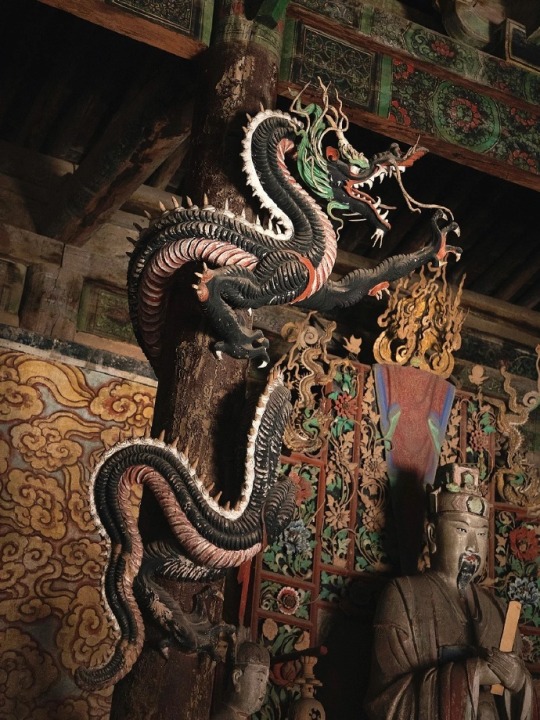
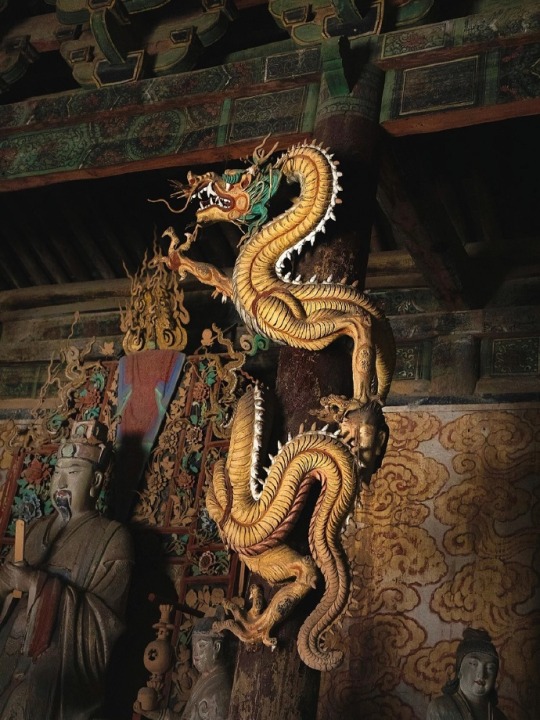
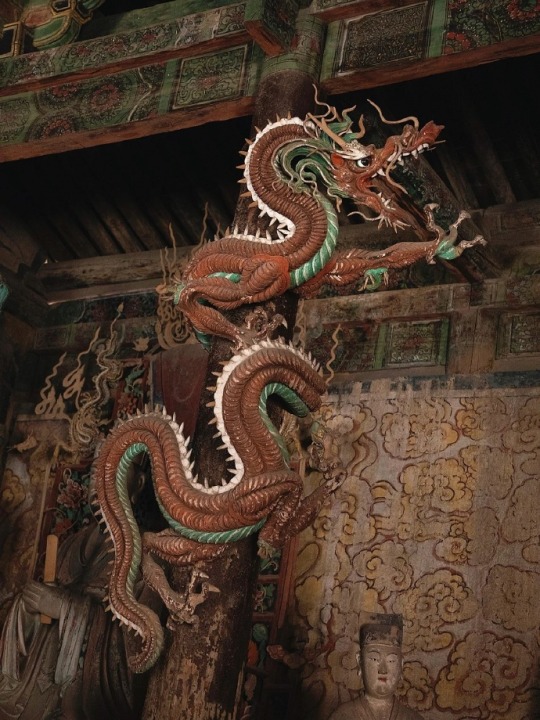
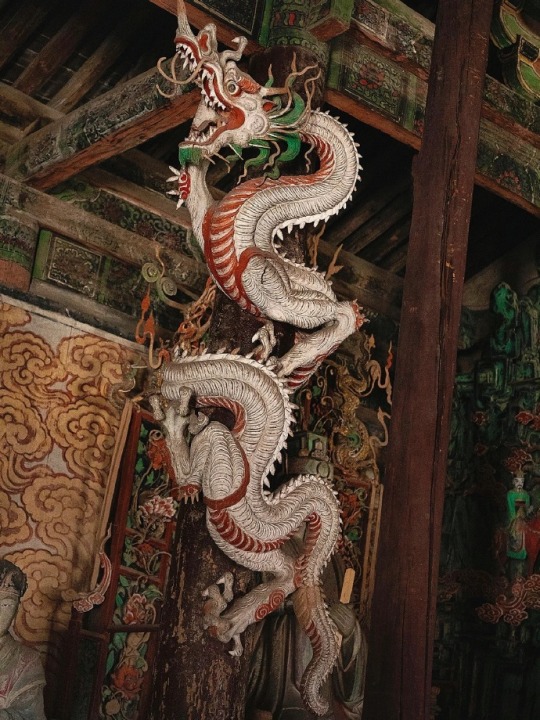

Mythological Realism: Elemental Dragons
Four-color coiled dragons on the pillars of the Supreme Talisman (Taifu) Temple (太符觀).
The dragons are painted in the colors of the primary elements, embodying the archetypal creative forces. In Chinese religious art, almost any concept can be expressed in the language of dragons.) Their children, descendants and relatives frolic on the temple walls among curly clouds.
In view of the striking liveliness, I would classify these images as mythological realism.)
Since its construction in the fifth year of the Jin dynasty (1200), the temple has been repeatedly expanded and supplemented with new buildings over the centuries. Most of the surviving statues are from the Ming dynasty.
The Supreme Talisman Temple is located in Fenyang (汾陽), Shanxi.
Photo: ©故尔耳
#ancient china#chinese culture#chinese art#chinese mythology#ming dynasty#taoist practices#religious art#chinese temple#Taoist temple#taoism#taoist#statue#sculptures#statues#daoism#jin dynasty#dragon#dragons#dragon art#creatures#wood carving#woodworking#temple architecture#wooden architecture#wooden buildings#chinese architecture
589 notes
·
View notes
Text
as the holidays come to a close, i'm left to wonder....
how does religion work in the pjo universe?
#pjo#percy jackson#percy jackon and the olympians#percy series#pjo series#pjo tv show#pjo hoo toa#pjo fandom#percy pjo#annabeth pjo#like i know rick riordan is a white goyische man#so he probably didn't think this through and just assumed that they all celebrated Christmas culturally#but how does religion play in the pjo universe#even if you're like christian do you just leave religion when you come to camp#like i understand that most kids are pretty irreligious and probably won't care about leaving religion#but as someone who went to religious school there's at least one kid who is devout as fuck and'll just keep practicing#also like plenty of religions practiced today are the same age as the ancient greek religion- ex. judaism and hinduism#how does that clash work-there were exchanges of jewish and hindu culture in the ancient greek era so it's safe to assume jewish and hindu#half-bloods would exist#also on the hindu can of worms- we are also a polytheistic religion#does belief in that renounce any connection to the greek gods#also the comedic potential of the clash in SO underutilized#i can see luke at some point just scraping the food into the hermes fire saying 'accept my offering- o g-d who is NOT greek'#or some other camper reciting the brahmarpanam or offering Du'a while offering food to the gods#you can't tell me at least one kid yelled up at the sky 'well i'm converting now! fuck you dad!'
95 notes
·
View notes
Text
Of Contracts Between Gods and Men
On the Aeorian Kinsey-Deicide scale I’m a solid 5 (near exclusively god-preserving) which may seem surprising to my many dear associates who want those fundamental truths of existence wrecked. Without digging in any further, let’s do some quick religious history review on the question: Do you owe anything to the gods and do they owe anything to you?
The answer is not as universal as many raised in the nigh inescapable miasma of Christian theology may think! Reciprocal (or even unilateral) responsibility in religion comes and goes across history and geography. The Norse Aesir, for example, created humans but don’t owe them nada and only rarely bothered messing with them. The Greek pantheon are significantly more touchy on the subject of their pride but a person could manage offering no prayers or sacrifices as long as they didn’t promise any prayers or sacrifices. Probably. Compare this to Mayan theology, wherein both gods and humans have significant co-responsibility in maintaining balance; with ritual and sacrifice key to the continued safety of the polity. Divine-mortal relationships can be classified as nondirectional, unidirectional, or bidirectional with various advantages and disadvantages to each model. Gods come in lots of shapes and the demands they make aren’t universal!
A phrase that will often come up in any divinity studies is “covenant”. Originally a translation of the Hebrew berith or Greek diatheke, and also present in Islam, the Bahai’i faith, and possibly historical Phoenician religious practices, covenant theology has metastasized in Christian scholarship to the point it was genuinely hard to research this piece while dodging blogs by guys named Richard. But, broadly, it’s the idea of making an explicit deal with power(s) greater than yourself where you both have sides of the bargain to uphold.
Contract law is not the solution to every problem on earth or in fiction, but when the issue is a large disparity in power and mutual fears of future adverse behavior…. to quote Kate Bush “I’d make a deal with (the) god(s).”
Vitally, compared to other bidirectional pacts in world religion, Exandria has some advantages. For one thing, they have a godeater they’re right now helping to suppress. As long as the gods remain behind the divine gate they need mortal champions to effect their will—but that only holds true as long as the Divine Gate stays up. And unfortunately the problem with a fence someone else has erected is that you don’t know if they’ve kept a key.
If I was mortality’s lawyer? I’d ask for a second layer to that divine hamsterball I’d ask for anything left of the godkilling spark to be kept by the temples of Vasselheim—if they can’t be trusted with it no one can. And I’d promise cooperation from people of a certain degree of civic responsibility, not coerced or threatened out, whole hearted. But terms and conditions may vary.
Anyway, I guess the thesis is that it’s a terrible sin to destroy something you can’t comprehend with no idea of what the outcome will be (and a lot of you don’t seem to get the inconceivable joy of having/knowing/being a god, even just in fiction) but you can bring any monstrosity to the negotiating table. Don’t kill your gods, unionize against them.
#cr spoilers#critical role#bells hells#cr meta#critical role spoilers#and again I should clarify that a bidirectional mutually responsible relationship isn’t exclusive to the ancient near east#the Mayans incans and Aztecs all have some degree of entwined duties between mortals and gods in their ritual practices#(and I’m sure other religious practices did too—I’m not ethnologist I only know the big twenty)#a sort of coresponsibility for the state of the heavens and of earth#with the incans sharing the permanent embodied godhood aspect that characterizes a lot of pacific islander faith#(with high status individuals Becoming the god upon ascension permanently mingling the realms of god and man)#the ancient levant and some parts of Iran just happen to have framed it as contract rather than mutually assured destruction#the diversity of ideas about what someone who is a person but bigger would be and act like across human civilization are fascinating!#it’s why I reject the idea that a plot about divinity has to follow any script—cultural conceptions of divinity don’t!
25 notes
·
View notes
Text

Paus.4.35.8
#I also love this sm <3#I wish people talk more about how greek mythology related to real ancient greece#people usually takes mythology like it's some kind of solid story like nobel or drama#but it's actually made by ancient greeks to explain their history...?#like yk this land is named like this because mythology thing#or our ancestor is a king or someone participated in some mythological events or blah blah blah#and religious thing!! like why people doing this religious practice and why the sanctuary is there#tagamemnon#diomedes#greek mythology
10 notes
·
View notes
Text
One of the funniest micro-microcosms of internet discourse is Hellenistic neopagans getting mad at people with academic interests in real life historical ancient Greek religion for getting stuff about the deities 'wrong'
#A lot of pagans understand that they're practicing a modern reinterpretation of an ancient religion that by nature is going to look#very different to the distant historical model#But the people who are under the impression that this is an unbroken religious tradition spanning millennia are wild with it#Like okay so then why aren't you performing animal sacrifices? Curious
14 notes
·
View notes
Text
The gods are not aware of us. That’s what I like most about Aristotle’s cosmology. The gods are perfect, and therefore they only think about perfect things (themselves). We are imperfect, therefore we are not worth thinking about. They don’t know that they caused us.
You’re probably more familiar with the Olympians—figures like Zeus, Athena, and Poseidon, the sort of Greek gods that appear in Percy Jackson or Disney’s Hercules. Those gods are deeply invested in human affairs. Homer portrays the gods sponsoring armies, and making alliances with humans. Aeschylus has Athena begin democracy. They have children with us, they accept offerings from us, they even lash out at us in judgment. But Ancient Greece was a huge civilization that lasted an incredibly long time. Sometimes they disagreed with each other.
For Aristotle, praying to the gods can’t ensure a good harvest or military success. It can’t even get their attention. We are able to relate to the gods, but it is a completely one-sided relationship. If your motivation for practicing religion is purely transactional, then there is no reason to care about these solipsistic prime movers. But for Aristotle, the gods can help us achieve virtue.
We can imitate them. We will never win their favor, we will never have their love, but we can follow their example. Although we will never be perfect, we can observe perfection and try to learn from it. We can be a little better than we are today. Perhaps that is enough.
#Im NOT saying this is better than religions with a personal or devotional or transactional god#but it’s a fascinating position#if your religion is important to you then one way to nurture your religiosity#is to compare and contrast with the alternative religions and spirituality#so if you have a devotional religious practice#then this is good to know about#this is NOT a knock on Percy Jackson#shoutout to rick riordan fr#gotta be one of my favorite young adult authors#I’m just saying he didn’t have time to cover every single theological position ever held by an Ancient Greek#nate's writing#philosophy#greek philosophy#classical theism#god#aristotle#original post
129 notes
·
View notes
Text
DANA YOU CAN’T HAVE BELOS BE RELIGIOUS AND NOT GO INTO WHAT HIS BELIEFS ARE WHEN IT’S A DRIVING FACTOR TO HIS CHARACTER !!! DO YOU KNOW HOW MANY DENOMINATIONS THERE ARE?!!! EVEN THOSE WHO ARE SUPPOSED TO BE PART OF THE SAME RELIGIOUS GROUP CAN HAVE THEIR BELIEFS AND PRACTICES VARY!!! THEY CAN BE INFLUENCED BY LARGE FACTORS SUCH AS TIME PERIOD AND LOCATION AND SEEMINGLY MINUTE FACTORS SUCH AS WHAT CHURCH THEY GO TO!!! ONE’S BELIEFS AREN’T STAGANT AND TEND TO EVOLVE OVER TIME EVEN FOR THE MOST DEVOUT!!! YOU CAN’T JUST BE LIKE “HE’S A PURITAN WITCH HUNTER” AND LEAVE IT AT THAT!!!!

#I’m so close to creating specific beliefs for Belos.#Me: *has severe religious trauma and a bunch of non- views of religion*#also me:#Fun fact there being multiple realms was a common ancient religious view even in monotheistic religions such as Christianity#This is still present today obviously though it’s less common ( from my experience anyway)#It’s also soooo interesting how stories of one religion can come from other religions and beliefs and practices can merge and split#the evolution of religious stories and practices is fascinating to me#I’m on my religious dissector arc#weird hyperfixation but okay#toh#emperor belos#philip wittebane#toh salt#toh critical#religious discussion#religion#tw religion#noelle's rambles
102 notes
·
View notes
Text
“Hades does ancient Greek culture badly because Hermes is Asian”
Buddy, in the first game, you could literally wield an assault rifle powered by a Christian angel.
#If someone complains that since the gods aren’t ethnically Greek it’s bad representation#I have to say find an ancient Athenian and an ancient Spartan and tell them they are from the same country and the same ethnicity#These myths we have are reconstructed#Also ask the ancient Athenian if a slave who was born in Athens lived in Athens and died in Athens was Athenian#They would say no the slave was a foreigner again being Greek was not a thing the way it is now with modern national identities#I literally saw someone put in a more verbose version of the 14 words on a post about Hades#They wanted to preserve Greek culture#But also were a practicing Wiccan#Which is a British created new religious movement that behaves over actual real paganism#Tumblr is a circus and I am one sad clown
4 notes
·
View notes
Text
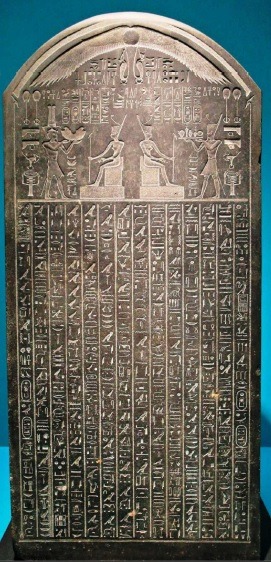
An incredible discovery has been made at Thonis-Heracleion, an ancient sunken city off the coast of Egypt. A carved slab dating from the reign of Pharaoh Nectanebo was found, setting out the list of offerings made to neighboring temples. This discovery is of great importance to the history of ancient Egypt and helps us to better understand the religious practices of the time. It's amazing to think that this slab remained hidden in the depths of the sea for centuries, preserving its history and message until it was finally discovered by archaeologists. This discovery is a true proof of the importance of preserving historical and cultural heritage for future generations.
#ThônisHéracléion#Ancient Egypt#Archeology#History#Cultural Heritage#Offerings#PharaohNectanebo#Religious Practices#Archaeological Discoveries#Preservation#Dive#Submersion#Underwater Discoveries
5 notes
·
View notes
Text
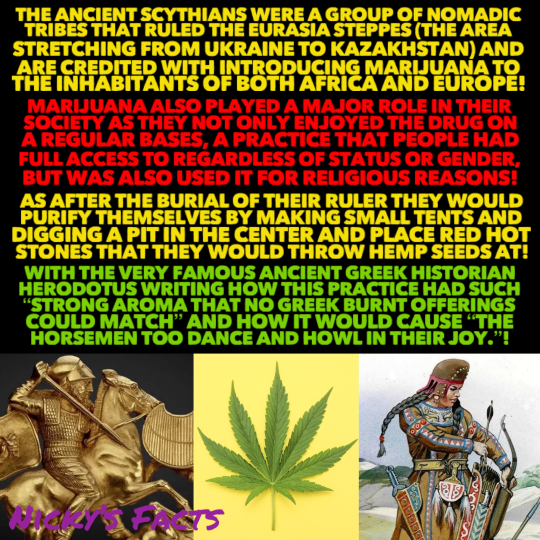
Scythians were the masters of the horse, the bow, and the hemp!😄
🐴🏹🌿
#history#scythians#ancient#marijuana#central asia#amazonians#scythian history#herodotus#hemp seeds#eurasia steppes#ukraine#kazakhstan#nomadic#ancient history#horsemen#horsewomen#weed#ancient religious practices#drugs#central asian history#nickys facts
11 notes
·
View notes
Text











Twenty-eight Constellations From The Temple Of Supreme Talisman
Pottery figurines of the Twenty-Eight Constellations from the Ziwei Pavilion (紫薇閣) in Supreme Talisman (Taifu) Temple (太符觀) are quietly chatting.
The Taoist temple itself, located in Fenyang (汾陽), Shanxi, was built in the fifth year of the Jin dynasty (1200). The Jade Emperor is enshrined in the main hall. The other halls on the both sides are dedicated to the Holy Mother of Houtu (后土聖母), aka Xiwangmu, The Queen Mother of the West, and to the Five Sacred Mountains (五嶽).
The figurines, just like some of the buildings, date back to the Ming dynasty. Each is about half a meter high. Of the original number, eight have been lost over the centuries. The rest were moved to the Shanxi Museum (山西博物院).
Photo: ©雪夜魚舟
#ancient china#chinese culture#chinese art#taoism#chinese mythology#taoist practices#taoist magic#ming dynasty#jin dynasty#pottery#ceramic art#ceramic#chinese miniatures#miniature art#sculpture art#clay sculpting#miniatures#religious art#chinese temple#daoism#taoist#taoist immortal#chinese astrology#astrology#zodiac#constellations
109 notes
·
View notes
Text
So I’m reading through these Greek Period magical papyri, and the thing I’ve had the strongest reaction to so far aren’t the invisibility potion or the multiple spells that are like “this is how you curse a woman to be unable to sleep until she has sex with you”, it’s this one spell where the caster is supposed to endear themself to Set/Typhon by putting themself in the mythological role of assisting Set with the murder of Osiris.
Like HEY

HEY ARE YOU SURE IT’S OKAY TO SAY THAT?
#Seeing this makes me really want to go down another rabbit hole from the one I’m already doing this for#Where I track down any surviving Set related worship/invoking material#His position in the mythology and religious practices is *fascinating*#Like the whole conceit of this spell is that Set/Typhon is really scary so you can get him to frighten other gods into doing stuff for you#And there’s a pre-spell spell you have to do to be protected while doing this#Because Set/Typhon is scary and getting his attention might not be a good thing#Ava has thoughts#ancient egypt stuff#Id in alt#Greek Magical Papyri#Tw caps#ask to tag#Sutekh
6 notes
·
View notes
Text
so i am deamericanizing myself by reading russian classic lit and listening to russian music again because i strongly need to reprogram my inner monologue into thinking in russian and also that my native language is so much more complicated and beautiful and romantic than english will ever be. even though there is basically no russian culture in history left except for 18-20 century postmodern art and poetry

#FUCK CHRISTIANS we could know everything about the main gods in slavic mythology if it wasn't for you nasty bitches destroying basically#every piece of writing left about our ancient religious practices?? literally kill yourself and FUCK NIKOLAI 2 TOO
4 notes
·
View notes
Text
Curse tablet! Curse tablet!!


actually this is maybe the most haunting curse tablet from bath
#fucking love curse tablets#so hilariously practical for an ancient magical/religious practice 😂#'hey jupiter can you specifically fuck up my neighbour? yeah no hes been letting his cattle drink too much water from our shared stream#so maybe you could idk fuck with him for about three months and blight his crops and make him move? thanks big guy heres the most expensive#roll of lead and fanciest metal pin i can afford in exchange oh also gunna sign your praises so dont worry ive got that locked down#just do him dirty yeah? thanks man'#you bet your butt curse tablets feature in the story lmao#writing wip#oh also the language find is cool too i just care less about ancient brits bc they were turncoats who accepted roman occupation way too easy#except Queen Bouddica ofc she was bomb af. A real one. pour one out for Boudicca you should've been in charge from the beginning
8K notes
·
View notes
Text
Ramayana No. 14: Be Good, Do Good, Purify Your Mind: A Simple Reflection on the Ramayana’s Timeless Wisdom
In the vast expanse of spiritual literature, few texts carry the weight and significance of the Ramayana. This ancient epic, deeply embedded in Hindu culture, tells the story of Prince Rama, whose life is a testament to the principles of righteousness, duty, and the eternal struggle between good and evil. As we delve into its rich narrative, it’s easy to get caught up in the details of battles,…
#ancient wisdom#Be good#Buddha#Buddhism#Christian teachings#comparative religion#Compassion#Dharma#Do good#ethical living#Hindu teachings#Inner purity#Interfaith dialogue#Interfaith harmony#Jesus#Meditation practice.#Mindfulness#Moral principles#Purify the mind#Ramayana#religious unity#righteousness#Sacred texts#spiritual guidance#spiritual reflection#spiritual wisdom#universal truth#Wisdom traditions
0 notes